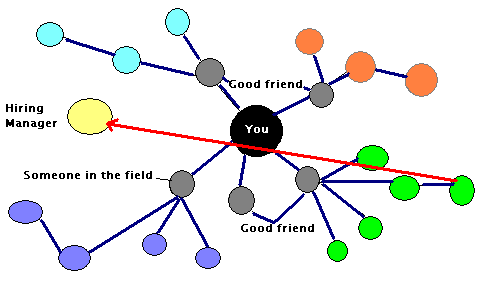According to a career transition study done by Drake Beam Morin, 64 percent of the almost 7500 people surveyed said they found their new jobs through networking.
Fifteen percent of job seekers use a search firm. Nine percent find jobs through newspaper ads, and eight percent get a job by sending resumes out through the mail. Do the math! Networking will get you a job.
Everyone has a network. A network is all of the people you know, from your best friend to the check clerk at the corner convenience store.
Colleen Kay Watson, a career counselor, advises you start your job search using these people. “It has been estimated that if you were to pass away today, your passing would impact two hundred and fifty lives.
Who are those 250 people Watson says will miss you when you’re gone? Make a list.
- Friends
- Relatives
- Neighbors, both current and past
- Fellow students in your day or night classes
- Acquaintances from sports, clubs, social activities, and so on
- College alumni
- Professors
- Co-workers and former co-workers
- Former employers
- People you do business with, such as your bank manager or insurance agent
- Professionals you know, such as your doctor, lawyer, or dentist
- Your pastor and members of your church
- Members of professional organizations you belong to
- People you’ve meet at conferences, trade shows, or career fairs
Call these people now. They obviously care about you. That is your personal network inventory group,” says Watson.
The people you know can introduce you to people they know and those people can introduce you to people they know, and so on and so on. One of these people is going to know a hiring manager who is looking for someone exactly like you.

You started career networking long before you knew you were doing it. Your address book is testament to that. Now, however, you are going to be deliberate about locating people who might be able to help you.
First, make an inventory of who you know now and how they might be able to help you. Your first official networking interactions are with these people, people who already know you and care about you. They are a friendly audience.
Secondly, expand your contacts by finding and talking with people you don’t already know. You find these people by joining trade groups, going to career fairs, contacting names your friends have given you, or contacting people whose names you doing research.
Every place you go where one or more people are present is a networking opportunity – the bus stop, the supermarket check out line, your friend’s birthday party. As you meet new people, find a way to let them know that you planning a career in hospitality, and ask if they might know anyone who might be willing to help you.
One conversation leads to another, but along the way, you need to follow-up with every person who gave you a referral or helped in any other way. This kind of follow-up is not only polite, but it helps cement their interaction with you in the memories of the people you talk with.